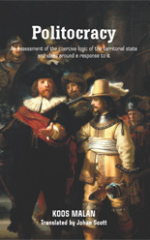Politocracy: An assessment of the coercive logic of the territorial state and ideas around a response to it

Politocracy: An assessment of the coercive logic of the territorial state and ideas around a response to it
by Koos Malan
Translated by Johan Scott
2012
ISBN: 978-1-920538-10-1
Pages: xii 356
Print version: Available
Electronic version: Free PDF available
| File Size: | 2.21 MB |
| File Type: | application/pdf |
| Hits: | 15046 Hits |